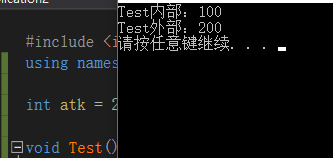::作用域运算符
::双冒号为全局运算符
#include <iostream> using namespace std; int atk = 200; void Test() { int atk = 100; cout << "Test内部:" << atk << endl; cout << "Test外部:" << ::atk << endl; } int main() { Test(); system("Pause"); return EXIT_SUCCESS; }
结果

命名空间使用语法
命名空间只能全局范围内定义
namespace A{ int a = 10; } namespace B{ int a = 20; } void test(){ cout << "A::a : " << A::a << endl; cout << "B::a : " << B::a << endl; }
命名空间可嵌套命名空间
namespace A{ int a = 10; namespace B{ int a = 20; } } void test(){ cout << "A::a : " << A::a << endl; cout << "A::B::a : " << A::B::a << endl; }
命名空间是开放的,即可以随时把新的成员加入已有的命名空间中
namespace A{ int a = 10; } namespace A{ void func(){ cout << "hello namespace!" << endl; } } void test(){ cout << "A::a : " << A::a << endl; A::func(); }
声明和实现可分离
头文件
#pragma once namespace MySpace{ void func1(); void func2(int param); }
cpp文件
void MySpace::func1(){ cout << "MySpace::func1" << endl; } void MySpace::func2(int param){ cout << "MySpace::func2 : " << param << endl; }
无名命名空间名称
意味着命名空间中的标识符只能在本文件内访问,相当于给这个标识符加上了static,使得其可以作为内部连接
namespace{ int a = 10; void func(){ cout << "hello namespace" << endl; } } void test(){ cout << "a : " << a << endl; func(); }
命名空间别名
namespace veryLongName{ int a = 10; void func(){ cout << "hello namespace" << endl; } } void test(){ namespace shortName = veryLongName; cout << "veryLongName::a : " << shortName::a << endl; veryLongName::func(); shortName::func(); }